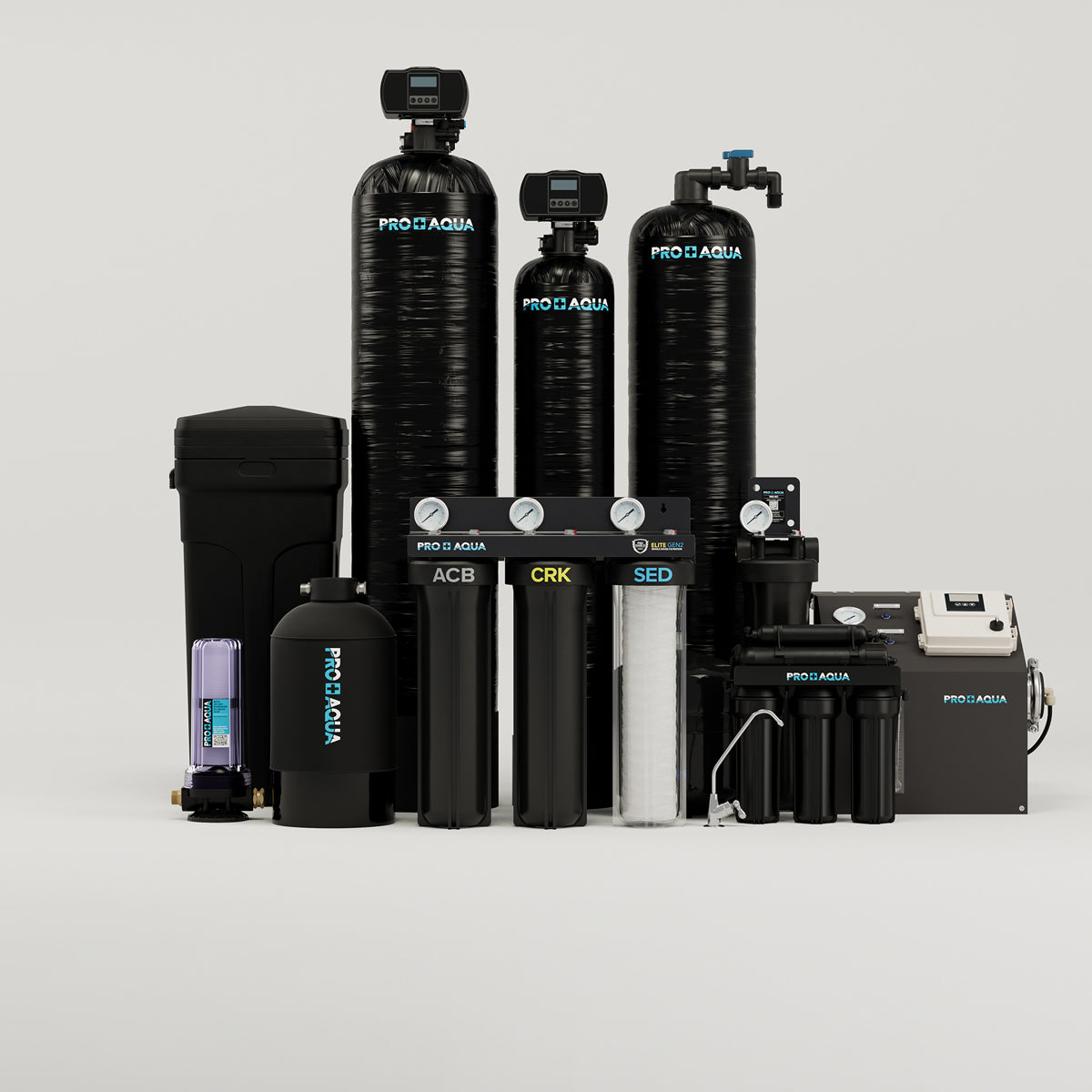Copper pipes have been used for hundreds of years to deliver water to faucets and household fixtures. Although the metal has fallen out of favor with many homeowners opting for plastic plumbing, copper pipes still represent a significant portion of American plumbing. Protecting these pipes from corrosion is not only a smart money-saving move, but it can also protect the health of you and your family. One of the best ways to reduce or eliminate corrosion in copper plumbing is by the use of a whole house water softener. In this guide, we will explore water softeners and how they can help keep your water supplies safe and free from corrosive materials.
Copper Pipes in Home Plumbing
For much of the 20th century, homes were constructed with copper piping to serve plumbing needs. This metal is ideal for water supply lines, as under normal circumstances copper does not affect the taste or safety of the water.

According to plumbing industry sources, as many as 80% of all homes in the U.S. have some amount of copper pipe serving the home. Developments of advanced plastics such as PEX and ABS and fluctuations in copper pricing have influenced the use of copper pipes in newer construction; older homes are still mostly served by copper piping or a combination of copper and other pipe materials.
Damage to Copper Plumbing: The Effects of Hard Water
Most water supplies in the United States are classified as “hard water”, or water with high levels of dissolved mineral salts like calcium and magnesium carbonates. The U.S. Geological Survey defines water hardness with a scale:
- 0-60 mg/L of calcium carbonate is classified as soft water;
- 60-120 mg/L of calcium carbonate is moderately hard water;
- 121-180 mg/L of calcium carbonate in hard water, and
- More than 180 mg/L of calcium carbonate is very hard.

Whether you get your water from a municipal source or a private well, chances are your water is hard; about 85% of all U.S. residents have hard water. When high mineral levels are present, this can lead to the formation of hard deposits in piping and fixtures. Known as mineral scale, this substance builds upon the walls of pipes, slowly constricting the pathway water needs to reach faucets. In time, pipes can become entirely clogged, resulting in expensive plumbing repairs.
Corrosion of Copper Plumbing
Hard water is a chronic problem for households without a whole house water softener. For homes with copper piping, hard water can lead to scale buildup. Even more threatening is the possibility of corrosion from other dissolved substances and chemicals in water supplies. If those substances are acidic, they can corrode plumbing piping and fixtures. Chemical ions react with the interior of copper pipes, leaching copper into the water supply and damaging pipes along the way.
Common sources of copper pipe corrosion include:
- Low pH or acidic water
- High pH or alkaline water (hard water)
- High levels of Total Dissolved Solids (TDS)
- Presence of sulfates or iron bacteria in water supplies
- Sediments or grit in water supplies that erode piping
Signs of plumbing corrosion can include bluish or greenish stains on porcelain fixtures like sinks and toilets. Pinholes may appear in copper pipes, leading to leaks in walls or under the home. As corrosion advances, homeowners have discovered severe damage to plumbing, water-using appliances, and interior structures – each requiring expensive repairs that could have been avoided by using a whole house water softener.
Health Dangers of Copper
Is copper in drinking water healthy? Although the human body needs trace amounts of copper for important metabolic processes, exposure to excessively high levels can lead to serious health consequences.
Symptoms of copper poisoning include:
- Vomiting
- Diarrhea
- Cramps
- Liver damage
- Kidney disease, including organ failure
Public health officials recommend avoiding drinking water with more than 1300 micrograms per liter of copper. Unfortunately, until symptoms of copper poisoning appear, many individuals do not know their water is contaminated with excessive copper from pipe corrosion or other sources. Only laboratory testing can reveal dangerous copper levels in drinking water supplies.
Preventing Corrosion with a Whole House Water Softener
Copper plumbing serves hundreds of thousands of residences in the United States. Corrosion of those pipes can lead to damage, requiring extensive and expensive repairs. This corrosion can also lead to severe illness or even death. How can you protect yourself and your loved ones from the dangers of copper pipe corrosion?

A whole house water softener is the ideal solution. Installed between water supply lines and household fixtures, this system removes mineral contaminants from the water through a chemical process known as ion exchange. The resin beads inside the water softener tank, known as polymeric ion exchange resins, are negatively charged. The dissolved minerals, such as copper, in water supplies, have a positive electric charge. The resin beads attract molecules of dissolved minerals and bind to them in the ion exchange process. Once the water passes through the resin, it continues to the plumbing fixtures like sink faucets, ice makers, and washing machines. The minerals have been removed and the water’s clarity, taste, and odor are improved. Water softener resins bind to:
- Chlorides
- Sodium
- Potassium
- Calcium
- Magnesium
- Sulfates
- Phosphates
- Copper
- Certain organic compounds
What are the resin beads in a whole house water softener made from? Resins may be made from several polymers, including cross linked polystyrene divinylbenzene or polystyrene sulfonate. Both of these materials are approved by the U.S. Food and Drug Administration (FDA) for use in the treatment of water for human consumption. The resin beads are porous, allowing them to have a greater surface area with which to trap mineral ions contaminating the water.
Over time, mineral buildup on the resins in a whole house water softener reduces the system’s performance. To recharge the resin media, most water softeners are equipped with a brine tank. Salty water from the brine tank is introduced into the resin bed, causing the trapped mineral ions to fall out of the solution. The wastewater is drained out of the softener tank, and the resin is once again ready to remove harmful mineral ions like copper from the water you use for drinking, bathing, and cooking. Water softeners may be used to treat municipal water supplies as well as water delivered from private wells.
Whole house water softener systems also protect delicate copper plumbing from the corrosive effects of dissolved mineral ions. This can ultimately save homeowners the costs of repairing or replacing plumbing pipes damaged by corrosion. By protecting the copper pipes, and by protecting the health of you and your loved ones, a whole house water softener is a valuable investment.







Leave a comment
This site is protected by hCaptcha and the hCaptcha Privacy Policy and Terms of Service apply.